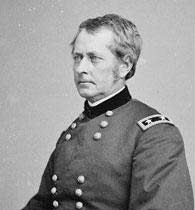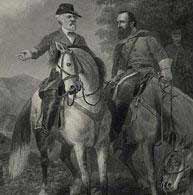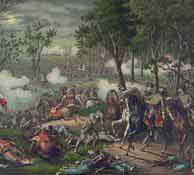Welcome to THE MAKING OF A NATION -- American history in VOA Special English.
In the early weeks of 1863, the American Civil War took a new political direction. President Abraham Lincoln had announced the Emancipation Proclamation. That measure freed the slaves in the rebel states of the South, though Lincoln's words fell on deaf ears.
Yet no longer was the Civil War a struggle just to save the Union. It had become a struggle for human freedom.
There was a change on the military side of the war, too. President Lincoln named a new commander for the Union's Army of the Potomac. This was the force that would try again to capture the Confederate capital at Richmond, Virginia.
This week in our series, Harry Monroe and Kay Gallant describe events during the spring of 1863.
VOICE ONE:

General Joe Hooker was the new commander of the Army of the Potomac. He replaced General Ambrose Burnside, when Burnside suffered a terrible defeat at Fredericksburg, Virginia, at the end of 1862. Burnside had replaced General George McClellan, when McClellan kept refusing to obey President Lincoln's orders.
Hooker had 130,000 men. They were well-trained and well-supplied.
The Confederate force opposing Hooker's was under the command of General Robert E. Lee. Lee had only about 60,000 men. They did not have good equipment. And their supplies were low. But their fighting spirit was high. They had defeated the Union army before. They were sure they could do it again.
VOICE TWO:
Lee's army still held strong defensive positions along high ground south of Fredericksburg. This was almost halfway between the capitals of the opposing sides: Washington and Richmond.
General Hooker did not plan to make the same mistake which General Burnside made at Fredericksburg. Burnside had thrown his army against Lee's defensive positions six times. Each time, the Confederates pushed them back easily. In one day of fighting, more than 12,000 Union soldiers were killed or wounded.
General Hooker had rebuilt the Army of the Potomac. Now he was ready to carry out his plan against General Lee.
Hooker left half his men at Fredericksburg, in front of Lee's army. He would move the other half into position behind Lee's army. If Lee turned to meet him, the troops at Fredericksburg would attack. The Confederate army would be caught between two powerful forces. Lee would have to withdraw, or lose his army.
VOICE ONE:
Hooker moved around past the end of Lee's line. Then he turned and started marching back behind it.
It was a hard march through thick woods, and across rough hills and valleys. The country was so wild that it was called the wilderness.
On the last day of April, 1863, the Union force reached Chancellorsville. Chancellorsville was a crossroads near the edge of the wilderness. The next day, the soldiers would be in open country. There, General Hooker could make the best use of his men.
Hooker was extremely pleased. Everything was going as he had planned. He told his officers: "I have Lee in one hand and Richmond in the other."
The next day, Union soldiers began moving out of Chancellorsville and the wilderness. They did not get far. They ran into several thousand Confederate soldiers. Lee had sent them to slow the Union force.
VOICE TWO:
The Confederate force was weak. General Hooker's officers believed they could smash through it without difficulty. They did not get a chance to try.
Hooker sent new orders: break off the fight. Return to Chancellorsville. Put up defensive positions.
Hooker's officers were shocked. They protested. Hooker stood firm. He said, "Lee must fight me on my own ground."
Robert E. Lee could not understand why the Union force had returned to Chancellorsville. But he was happy it did. Now he had time to prepare his men for battle.
VOICE ONE:

Lee met that night with his top general, Stonewall Jackson. They discussed the best way to attack the Union force.
The center of the Union line was strong. The right side was not. Jackson was sure he could get around behind it. Lee asked Jackson how many men he would take. "All of them," Jackson answered. "28,000."
This meant Lee would have only 14,000 men to face General Hooker. If the Union force attacked before Stonewall Jackson got into position, Lee could not possibly hold it back.
Lee was taking a huge chance. He thought about it for a moment. Then he told Jackson to get started.
VOICE TWO:
Jackson's men began to leave the next morning. Union soldiers watched as they marched away. General Hooker thought Lee was withdrawing.
It took Jackson only half a day to get behind the Union force. He spent a few more hours putting his troops into position. Then he attacked. It was six o'clock in the evening.
The right end of the Union force was not prepared for an attack. The soldiers could not believe their eyes when they saw Confederate troops running out of the woods behind them. Many Union soldiers were killed or wounded. Thousands fled.
The sun went down. The fighting continued under a bright moon. The Confederate troops kept moving forward. The Union troops kept falling back. One northern soldier wrote later: "Darkness was upon us. Jackson was upon us. And fear was upon us."
VOICE ONE:
Jackson seemed to be everywhere. He rode his horse among his men, urging them forward. He would not let the Union force escape.

As Jackson and some of his officers rode into a cleared area of the woods, shots rang out. The bullets came from Confederate guns. The Confederate soldiers thought they were firing on Union officers.
Jackson fell from his horse. Two bullets had smashed his left arm. Another bullet had hit his right hand. He was hurried to the back of the line. A doctor quickly cut off his left arm and stopped the heavy bleeding.
Jackson seemed to get better. Then he developed pneumonia. He was unconscious most of the time. He seemed to dream of battle, and shouted commands to his officers. Then he grew quiet. He opened his eyes and said, "Let us pass over the river and rest in the shade of the trees."
The great Confederate General, Stonewall Jackson, was dead.
VOICE TWO:
While Jackson lay dying, the battle of Chancellorsville continued.
Robert E. Lee's Confederate army was much smaller than Joe Hooker's Union army. But for five days, Lee kept part of his army moving between Chancellorsville and Fredericksburg. Wherever the Union army attacked, Lee quickly added more men to his lines. The Union army could not break through.
The fighting was taking place on the south side of the Rappahannock River. The Union army's supply lines were on the north side.
Spring rains were beginning to make the Rappahannock rise. General Hooker did not want to get trapped without food and ammunition. So he ordered his men back across the river.
VOICE ONE:
The South had won the battle of Chancellorsville. Robert E. Lee was sure of that. Once again, he had forced back the Army of the Potomac. But the Union army was not hurt seriously. New soldiers would soon take the place of those lost in battle.
Lee, however, would find it more difficult to replace his soldiers. The South was running out of manpower. Every Confederate army needed men -- more and more men. Yet fewer and fewer southern boys were willing to become soldiers.
Anti-war movements were, in fact, active in both the North and South. There were a number of protests against the military draft. Some turned violent.
In the North, a political party was created to oppose the Civil War. Leaders of this peace party were called Copperheads. They got the name because they wore a copper penny showing the head of an Indian.
That will be our story in our next program on the Civil War.
(MUSIC)
ANNOUNCER:
Our program was written by Frank Beardsley. The narrators were Harry Monroe and Kay Gallant. Our series can be found online with transcripts, podcasts and historical images at voaspecialenglish.com. You can also follow our weekly programs on Twitter at VOA Learning English. Join us again next week for THE MAKING OF A NATION -- an American history series in VOA Special English.
Related stories:
American history series: at Bull Run, a terrible defeat for the North
American history series: South defends its capital
American history series: the Civil War at sea
Lincoln names a general to defend Washington
American history series: the North loses the first major battle of the war
American history series: the Civil War's first days
(Source: VOA 英语点津编辑)